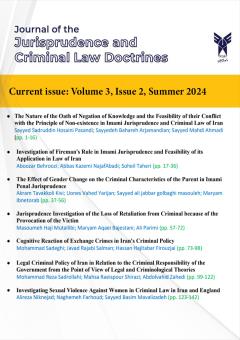Investigation of Fireman's Rule in Imami Jurisprudence and Feasibility of its Application in Law of Iran
Subject Areas : Jurisprudence and Criminal Law DoctrinesAboozar Behroozi 1 , Abbas Kazemi NajafAbadi 2 * , Soheil Taheri 3
1 - PhD Student in Private Law, Vahedarak, Islamic Azad University, Arak, Iran.
2 - Assistant Professor, Department of Law, Allameh Tabatabai University, Tehran, Iran.
3 - Assistant Professor, Department of Law, Quds City Branch, Islamic Azad University, Quds City, Iran.
Keywords: rule of benevolence, rule of fireman, guarantee of fireman.,
Abstract :
Sometimes, some obligatory actions require violating the rights of others. In the law literature of Common Law, this issue is called the firefighter rule. This rule is derived from the event of a firefighter's action to extinguish a fire, which may harm the rights of the neighbors during extinguishing fire. The principle is that the law must be fully implemented, but sometimes the law needs to be violated for the most obligatory. The following article has studied and surveyed the firefighter rule from jurisprudence approach. It was concluded that currently only according to the jurisprudential rule of benevolence and reference to principle 167 of the Constitution, first the demand for compensation is raised against the rescuer, which is usually approved, then a claim by the rescuer against the rescued, which is accepted by the interpretation of the judge depends on the jurisprudence rules of La-zarar, beneficence, benevolence and loss. Being written of the country's legal system requires that legal issues be clearly stated in laws that not lead to the ambiguities resulted from legal gaps. Therefore, there is a need to consider having good intentions as an exception to committing illegal acts in the civil and criminal laws of the country, so that with the elimination of the flow of administrative and judicial formalities of this matter, the motivation of benevolence and helping fellow human beings increases.
قرآن کریم.
1. ابن منظور، محمد بن مکرم، (1411ق)، لسان العرب، قم، دارالکتب.
2. امیری قائم مقامی، عبدالمجید، (1347)، حقوق تعهدات، تهران، گنج دانش.
3. انصاری، مرتضی بن محمد امین، (1368)، کتاب المکاسب، قم، انتشارات علامه.
4. انصاری، محمد علی، (1415ق)، موسوعة الفقهیة المسیرة، قم، مجمع فکر اسلامی.
5. تفسیلی، ابوالفضل، (1410ق)، وجوه القرآن، قم، دار الکتب.
6. حجازی، عبد الحی، (1409ق)، استفتائات، قم، دار الکتب.
7. حراج، علیرضا؛ پورمحمد، اباست؛ بشیری، اکبر، (1403)، اجرای احکام مدنی خسارات روحی در حقوق ایران و انگلستان، آموزه¬های فقه و حقوق جزاء، شماره: 1، ص23-42.
8. حیاتی، علی عباس، (1380)، اداره فضولی مال غیر در حقوق مدنی ایران با مطالعه تطبیقی در حقوق مصر و فرانسه، مجله حقوقی دادگستری، شماره: 37، ص1-25.
9. خویی، سید ابوالقاسم، (1420ق)، مصباح الفقاهه، قم، دار الکتب.
10. سنهوری، عبد الرزاق احمد، (1412ق)، نظریه¬ عمومی تعهدات، بیروت، انتشارات محمد الدّایه.
11. طبرسی، فضل بن حسن، (1422ق)، مجمع البیان، قم، دارالکتب.
12. عامری، پرویز، (1381)، مبانی اداره مال غیر در اسلام، مجله رهنمون، شماره: 1، ص1-33.
13. فاضل لنکرانی، محمد، (1411ق)، القواعد الفقهیة، قم، دار الکتب.
14. کاتوزیان، ناصر، (1370)، حقوق مدنی، اعمال حقوقی، تهران، انتشارات بهمن برنا.
15. کاتوزیان، ناصر، (1371)، وقایع حقوقی، تهران، انتشارات دانشگاه تهران.
16. کاتوزیان، ناصر، (1374)، الزامهای خارج از قرارداد (ضمان قهری)، تهران، انتشارات دانشگاه تهران.
17. لطفی، اسد الله، (1379)، قاعده احسان، مجله دانشکده حقوق و علوم سیاسی دانشگاه تهران، شماره: 52، ص1-33.
18. لطفی، اسد الله، (1379)، موجبات و مسقطات ضمان، تهران، انتشارات مجد.
19. مراغهای، میر عبدالفتاح، (1418ق)، العناوین الفقهیة، قم، دفتر انتشارات اسلامی.
20. مصطفوی، سید مصطفی، (1384)، احسان، منبع مسئولیت، فقه و حقوق، شماره: 6، ص1-33.
21. مکارم شیرازی، ناصر، (1411ق)، القواعد الفقهیة، قم، مدرسه امام امیرالمؤمنین (ع).
22. موسوی بجنوردی، میرزا حسن، (1371)، القواعد الفقهیة، قم، مؤسسه مطبوعاتی اسماعیلیان.

